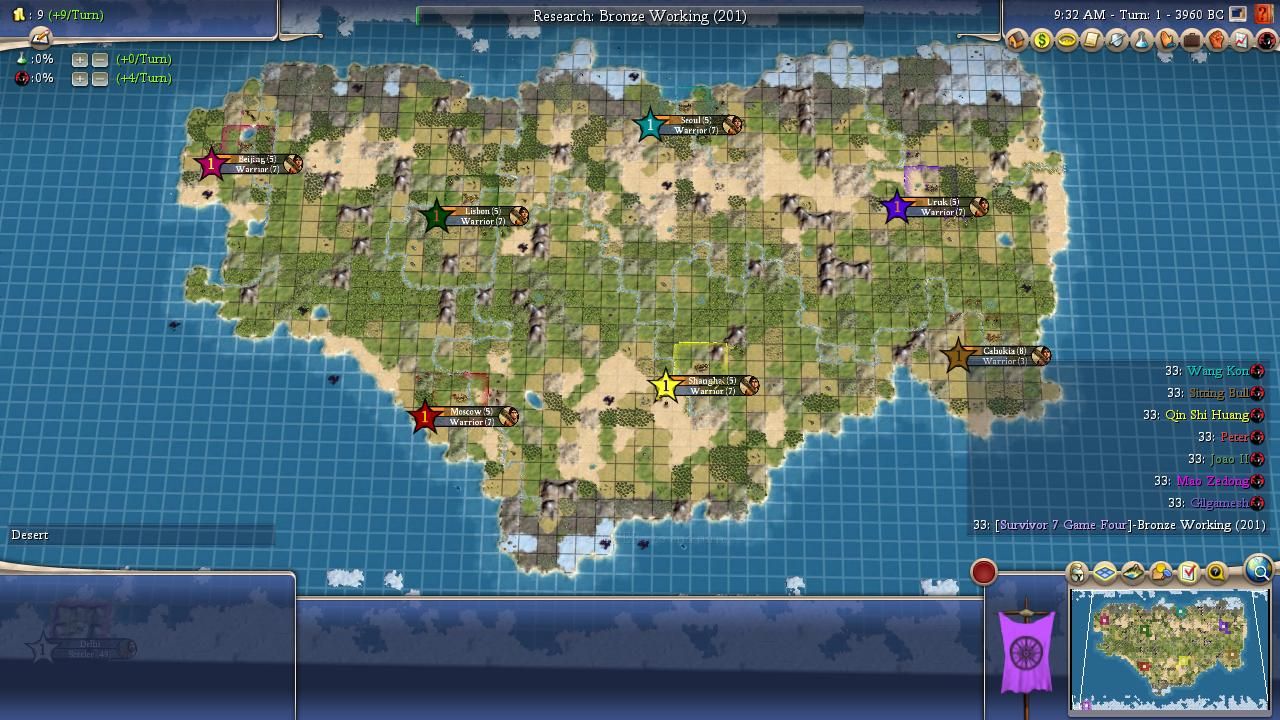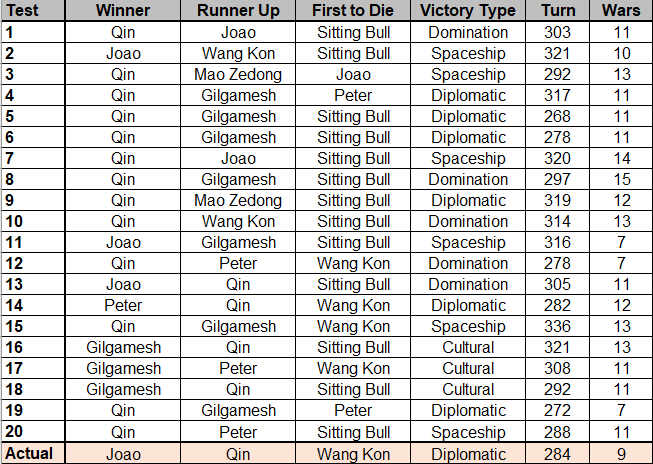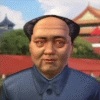


Game Four Alternate Histories Spreadsheet
One of the recurring features of past seasons of AI Survivor have been our "alternate histories", running additional iterations on the same maps to see if the same events would play out again. Game Four was a shocking upset as massive pregame favorite Gilgamesh failed to capture either of the top two spots which were instead grabbed by Joao and Qin. Was that something which would unfold in each game? This was a topic that called for more investigation with alternate history scenarios. Following the conclusion of previous seasons of AI Survivor, I had gone back and investigated some of the completed games and found that they tended to play out in the same patterns over and over again. While there was definitely some variation from game to game, and occasionally an unlikely outcome took place, for the most part the games were fairly predictable based on the personality of the AI leaders and the terrain of each particular map. Would we see the same patterns play out again and again on this particular map?

The original inspiration to run these alternate histories came from Wyatan. He decided to rerun the Season Four games 20 times each and publish the results. The objective in his words was twofold:
- See how random the prediction game actually is. There's a natural tendency when your predictions come true to go "See! Told you!", and on the contrary to dismiss the result as a mere fluke when things don't go the way you expected them to (pleading guilty there, Your Honour). Hopefully, with 20 iterations, we'll get a sense of how flukey the actual result was, and of how actually predictable each game was.
- Get a more accurate idea of each leader's performance. Over 6 seasons, we'll have a 75 game sample. That might seem a lot, but it's actually a very small sample, with each leader appearing 5-10 times only. With this much larger sample, we'll be able able to better gauge each leader's performance, in the specific context of each game. So if an AI is given a dud start, or really tough neighbours, it won't perform well. Which will only be an indication about the balance of that map, and not really about that AI's general performance. But conversely, by running the game 20 times, we'll get dumb luck out of the equation.
Wyatan did a fantastic job of putting together data for the Season Four games and I decided to use the same general format. First I'll post the resulting data and then discuss some of the findings in more detail. Keep in mind that everything we discuss in these alternate histories is map-specific: it pertains to these leaders with these starting positions in this game. As Wyatan mentioned, an AI leader could be a powerful figure on this particular map while still being a weak leader in more general terms. Now on to the results:
Game One | Game Two | Game Three | Game Four | Game Five
Game Six | Game Seven | Game Eight | Game Nine | Game Ten
Game Eleven | Game Twelve | Game Thirteen | Game Fourteen | Game Fifteen
Game Sixteen | Game Seventeen | Game Eighteen | Game Nineteen | Game Twenty


(Note : "A" column tracks the number of war declarations initiated by the AI, "D" the number of times the AI is declared upon, "F" the points for finish ranking, and "K" the number of kills.)
I picked out Game Four to do an early set of alternate histories because I was burning with curiosity to figure out what happened to Gilgamesh. Given his amazing starting position, I would have wagered almost anything that the Sumerian leader would come out of the alternate histories with a commanding lead in the total scoring. Obviously he had just been unlucky in the actual Game Four, right? Well... as it turned out, there was a leader that won victories in 65% of the alternate histories and dominated the rest of the field, but that individual was Qin and not Gilgamesh! The Sumerian king had to settle for being the next-best leader on this map, still a powerful entity in his own right but more likely to take the Runner Up spot than top the field. Qin was the 800 pound gorilla as he won EIGHT games in a row at one point and racked up an incredibly impressive 95 total points across the alternate histories. Basically everyone missed the strength of Qin in this scenario - what had happened here to cause me and the rest of the community to misread this game so badly?
The first realization that came to me while watching these matches was the fact that Qin actually had an extremely strong starting position of his own. The yellow Chinese leader had double corn resources and a copper resource at his capital, then always settled his second city to the northwest in a spot that picked up another corn and another copper. These were perfect resources to synergize with his Agriculture/Mining starting techs and Qin almost always knocked out Bronze Working at an extremely early date, thus giving him excellent production in his first two cities plus axe/spear units for defense. In fact, Qin often built a super early Stonehenge with that production and effectively picked up the mini-Creative trait as well for himself. As a result, Qin almost always came out of the landgrab phase with a territorial and score lead. We actually watched one of the worst Qin performances on Livestream, a game where he ignored The Wheel tech forever to crash his economy and had a city razed by the barbarians. However, it turned out that we were seeing a bottom 10% performance from Qin; in most games, he had no such issues with The Wheel and didn't lose cities to barbs. Thus the actual strength of Qin was higher than what we experienced.
Qin also had a strong position in the middle of the map with weak opposition nearby that provided many opportunities for expansion. He bordered both Sitting Bull and Wang Kon, high peace weight leaders who were repeatedly dogpiled in most games, and Peter who wasn't much stronger himself. Qin's location on the central river networks meant that he usually either picked up the dominant religion or founded a religion that became widely spread. This meant that he almost never found himself in 1 vs 2 wars and could snowball to massive size over weaker foes. By way of contrast, Gilgamesh normally founded a religion only to have poor success at spreading it to the rest of the field. He would also conquer Sitting Bull in virtually every game only to find himself stuck: nowhere else to go because Qin was the next AI leader to the west and Qin was the top AI on the map. We experienced both of these things in the real Game Four, a diplomatically-isolated Gilgamesh who lacked the ability to expand after conquering Sitting Bull, and as such he found himself stuck in the second-place spot in many of these matches. The community was absolutely correct that Gilgamesh would run over Sitting Bull, it just happened to turn out that this wasn't enough for him to translate into easy victories because Qin was usually even bigger and stronger than Gilgamesh.
The only other leader on the map to be consistently strong was Joao, the winner of the actual Game Four. I had been hesitant to pick him in the contest even though he had a nice capital because I thought his medium-high peace weight would get him dogpiled by his low peace weight neighbors. The alternate histories showed that this fear was completely correct: Joao declared 12 offensive wars while getting hit with 68 (!) defensive wars across the 20 games. He was relentlessly attacked over and over again and found himself eliminated 60% of the time as a result. However, in the 40% of the games where Joao was able to avoid getting hit with early aggression, he went on to win three additional times, showing that the result in Game Four wasn't a fluke. Basically if Joao could make enough friends via religion or mutual military struggle bonuses, he was very much in contention to grab a victory for himself. This was of course what happened in the real Game Four with an assist from an unusually-weak Qin. More often though, Joao's peace weight dragged him down and resulted in his elimination.
The four remaining leaders were all pretty irrelevant on this map, with only a single (underserved) victory between them along with a scattering of second place finishes. Peter had the sole win, a Diplomatic victory which landed when he was far behind Qin in Game #14 with the Chinese already preparing their spaceship for launch. Peter's other second-place finishes were all distant results where the Russians trailed far behind a more dominant winner. Mao was a bit less likely to get eliminated than Peter thanks to his corner start but had even lower odds to claim a runner up spot. Mao's starting position was poorly suited to China's techs (the exact opposite of Qin) and he tended to pick fights with Joao that he could never win without a lot of help. Wang Kon was simply dogpiled into oblivion over and over again resulting in an 85% elimination rate. He did manage to finish in second place in two of the three games where he survived... but that was the whole problem, he only survived to the finish in 3 out of 20 games. Korea's high peace weight left Wang Kon without much of a shot in this game; he didn't even manage to do anything particularly interesting in terms of trolling the rest of the field.
Finally, Sitting Bull was completely helpless on this map and lived up to his reputation as a Sitting Duck. The Native American leader was saddled with a poor start from the outset, with limited space available and weaker resources in his vicinity, only to find that he was neighboring the two strongest AI empires on the map. Sitting Bull would invariably exit the landgrab phase in last place on the scoreboard and then turtle up in the corner until someone (usually Gilgamesh) put him out of his misery. He was First to Die 65% of the time, scored zero points across the 20 replays of the map, and looked like he was going to have a 100% elimination rate until Sitting Bull managed to hang on with a single city remaining in Game #19 thanks to Qin winning early via Diplomatic instead of the normal space route. Sitting Bull was the absolutely correct choice for First to Die on this map and I'm still a bit annoyed that my pick of him didn't end up hitting in the real game.
Now for a look at the individual leaders:

Qin Shi Huang of China
Wars Declared: 51
Wars Declared Upon: 20
Survival Percentage: 90%
Finishes: 13 Firsts, 4 Seconds (73 points)
Kills: 22
Overall Score: 95 points
Qin excelled at absolutely everything in this game, taking the top position in almost every category imaginable. He had twice as many first place finishes as the other six leaders combined, the best survival rate at 90%, and narrowly missed out on having the most kills thanks to slightly unfortunate luck at getting the "last hit" blows on enemy nations. Qin simply did everything well and this was reflected in the fact that he won all types of victories in roughly equal proportions aside from Culture (which he never showed any interest in pursuing). In fact, Qin won by the Diplomatic route five different times which is incredibly rare in our AI Survivor games. This was not a coincidence as Qin was broadly popular with the other low peace weight AI leaders, especially Peter and Mao. Both of them put him over the top in the United Nations on more than one occasion thanks to shared low peace weight and common military enemies. While Qin's Industrious/Protective traits are not particularly great for AI Survivor, he found himself in the right starting position with the ideal starting techs to get off and running in this particular scenario.

Gilgamesh of Sumeria
Wars Declared: 57
Wars Declared Upon: 21
Survival Percentage: 80%
Finishes: 3 Firsts, 7 Seconds (29 points)
Kills: 24
Overall Score: 53 points
The heavy pregame favorite still wound up doing quite well for himself if trailing well behind Qin's pole position. Gilgamesh was successful in conquering Sitting Bull (or at least splitting his territory with Qin) in practically every game, only to stall out afterwards and have difficulty absorbing any more rival domains. The weakness of Sitting Bull was the main reason why Gilgamesh narrowly claimed the kill lead over Qin in these alternate histories. One of Gilgamesh's biggest issues was a surprising struggle to make allies with the rest of the field, often due to following a religion that hadn't spread elsewhere. There were a bunch of games where Gilgamesh was running neck-and-neck with the other top leaders only to find himself on the wrong end of a 1 vs 2 war or trigger a defensive pact amongst his competitors, that sort of thing. He also sabotaged himself in a couple of games by chasing after the Cultural victory condition, especially in Game #15 where he threw away a certain victory and allowed Qin to steal a spaceship ending. On the other hand, Gilgamesh also snagged a win in Game #18 when his third city went Legendary shortly before Qin could hit Domination so this may have evened itself out over time. The fact that Gilgamesh never won by Domination or even came close to it was an indication that he wasn't the supreme juggernaut so many of us expected heading into this match.

Joao of Portugal
Wars Declared: 12
Wars Declared Upon: 68
Survival Percentage: 40%
Finishes: 3 Firsts, 2 Seconds (19 points)
Kills: 14
Overall Score: 33 points
Joao was the only other leader who seriously competed for first place in the alternate histories, proving that his victory in the actual Game Four was a realistic (if low-odds) outcome. The key to Portugal's success was avoiding dogpile wars from Joao's neighbors. He could easily handle Mao or Peter in isolation, eliminating one or both of them in many of these games, however Joao struggled when they came after him in a tag-team combination. There were other games where Joao was attacked four, five, or even six different times before some kind of ending was achieved. The tally of 12 offensive wars against 68 defensive wars really does tell the story here; it's genuinely impressive that Joao had three wins and two more second place finishes given how hostile his diplomatic situation turned out to be. If Wang Kon and/or Sitting Bull had managed to be more than speedbumps in this scenario, Joao might have ended up as the top AI on the map.

Peter of Russia
Wars Declared: 51
Wars Declared Upon: 17
Survival Percentage: 40%
Finishes: 1 First, 3 Seconds (11 points)
Kills: 9
Overall Score: 20 points

Mao Zedong of China
Wars Declared: 35
Wars Declared Upon: 9
Survival Percentage: 55%
Finishes: 0 Firsts, 2 Seconds (4 points)
Kills: 5
Overall Score: 9 points
These two leaders were easy to group together as they were both ineffective low peace weight leaders from the western side of the map. As I mentioned above, their biggest difference was that Peter was slightly more successful while also having higher odds to be eliminated due to his more central position. Neither of them could stand up to Qin or Joao and they were frequently bullied by either one of these more powerful neighbors in their vicinity. Peter went to war about as often as Qin and Gilgamesh only with far less to show for his attacks; the evidence continues to pile up that he's a mediocre to poor AI personality, not helped by having non-synergistic leader traits. I have to feel that Catherine would have accomplished a lot more from this same spot on the map. As for Mao, he was highly passive across the alternate histories with noticeably fewer wars from both an offensive and defensive perspective. In fact, there were two games where he never fought a single war whatsoever!  That's very rare indeed for AI Survivor purposes, lasting the whole match without a single conflict. An unusual number of Mao's invasions were cross-map offensives as he liked to attack Wang Kon and even Sitting Bull at times which obviously didn't do much to help his position. Basically these were the two "dud" AI leaders on this map who had low peace weights.
That's very rare indeed for AI Survivor purposes, lasting the whole match without a single conflict. An unusual number of Mao's invasions were cross-map offensives as he liked to attack Wang Kon and even Sitting Bull at times which obviously didn't do much to help his position. Basically these were the two "dud" AI leaders on this map who had low peace weights.

Wang Kon of Korea
Wars Declared: 14
Wars Declared Upon: 50
Survival Percentage: 15%
Finishes: 0 Firsts, 2 Seconds (4 points)
Kills: 1
Overall Score: 5 points

Sitting Bull of the Native Americans
Wars Declared: 4
Wars Declared Upon: 39
Survival Percentage: 5%
Finishes: 0 Firsts, 0 Seconds (0 points)
Kills: 0
Overall Score: 0 points
And the remaining two AI leaders were even bigger duds who happened to have high peace weights instead. Both of them were relentlessly dogpiled by the other leaders on the map which led to the lopsided offensive vs defensive war tallies listed above. It's honestly almost impossible to get a ratio like the 4 offensive / 39 defensive figure that Sitting Bull had in this game, just barely shy of having 10x as many defensive wars as offensive ones. I was never able to see much of either leader because both of them were consistently eliminated at such an early date in each match. Sitting Bull was the more likely candidate to be First to Die, falling first in no less than thirteen different games, however Wang Kon had the most ignominious defeat with a stunning Turn 84 (!) knockout in Game #16. I had set the autoplay to run that match, got up to get a quick drink, and Wang Kon was dead in less than 60 seconds before I sat back down again - it was insane. These were completely helpless AI leaders who were lucky to survive at all; they were never even remotely competitive to claim an actual victory for themselves.

After running the alternate histories, it's clear that we watched a match which was somewhat unlikely on the finer details while matching the broader outlines of the repeated playthroughs. At first glance that might not seem like the case: Qin didn't end up as the winner, Gilgamesh didn't come in second place, and Sitting Bull wasn't the First to Die. However, leaving aside the main scoring categories for a moment, the other aspects of the game were all pretty typical for the alternate histories. Wang Kon and Sitting Bull were both weak leaders who were ganged up on and eliminated at early dates. Peter and Mao were second-tier leaders with no realistic chance at winning as the power trio of Qin, Gilgamesh, and Joao competed for the two playoff spots. Gilgamesh achieved an early successful conquest only to find himself diplomatically isolated and unable to push further west. Diplomatic victories weren't even that uncommon for this scenario as I had five more of them in the alternate histories! So while it was pretty frustrating for someone like me to narrowly miss out on lots of points in the contest with a pretty good read on the overall map, I can't say that this was a situation like some alternate histories where the real game was a wacky outlier result. Joao was stronger than the norm and Qin a bit weaker, otherwise this was a pretty solid representation of how the scenario usually played out.
Thanks as always for reading, I hope you enjoyed this look back at Game Four!



